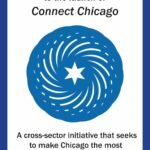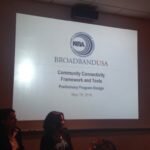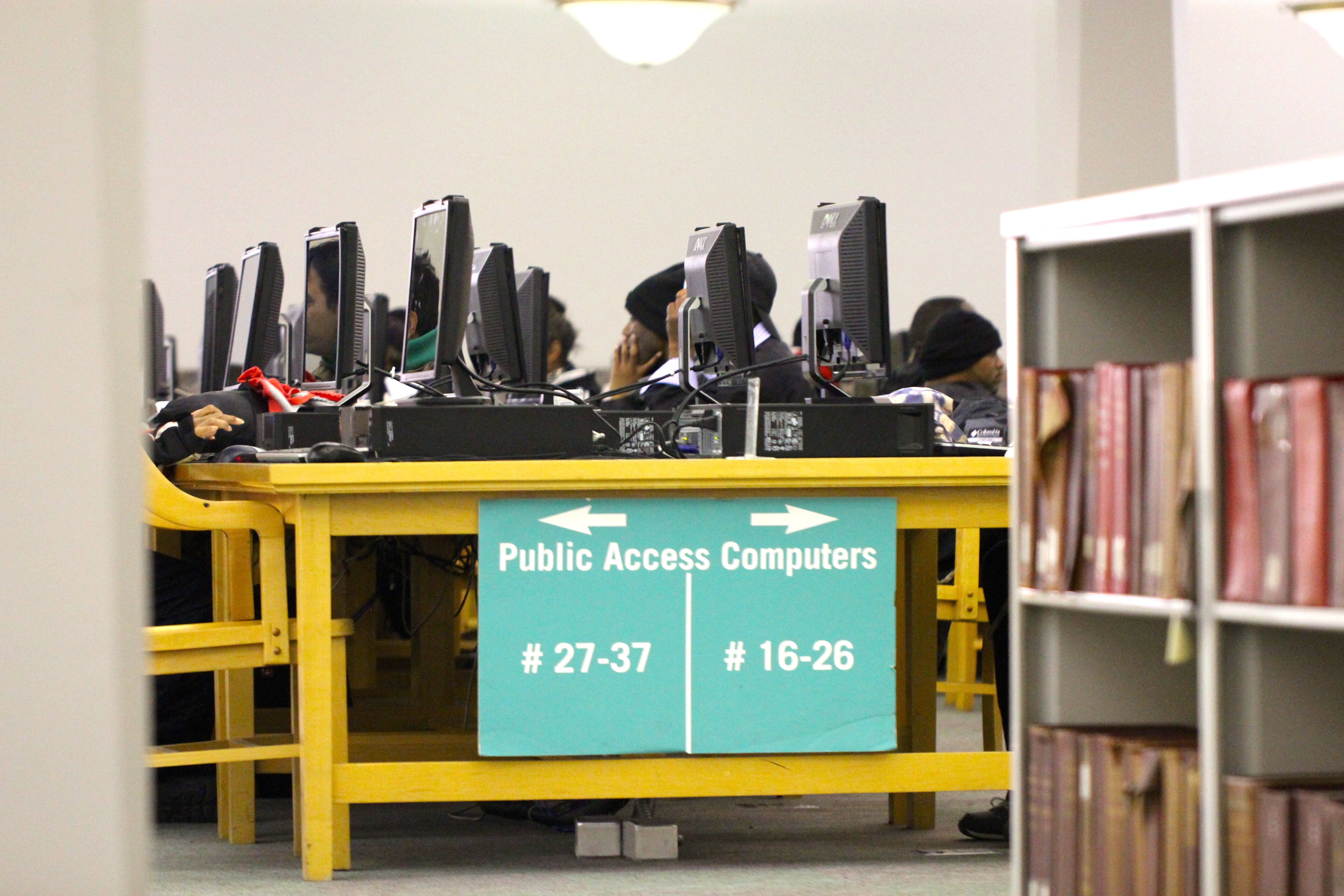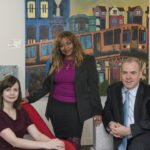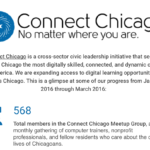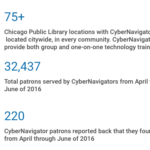 Earlier this month, Chicago Chief Technology Officer John Tolva unveiled the city’s very first technology plan. The plan was a result of a year-long process of research, brainstorming, and thinking about how to make all of Chicago competitive in the new digital economy.
Earlier this month, Chicago Chief Technology Officer John Tolva unveiled the city’s very first technology plan. The plan was a result of a year-long process of research, brainstorming, and thinking about how to make all of Chicago competitive in the new digital economy.
This plan is a comprehensive framework for growing Chicago’s technology sector , getting broadband connectivity for everyone, and ensuring that Chicago remains a leader in open government data .
The plan also highlights the work that the civic technology community has been doing in Chicago. From the weekly OpenGov Hack Nights, the Smart Communities Program, and youth STEM programs; Chicago already enjoys a strong set of technology strengths and this plan will enable the city to advance even further.
Smart Chicago Collaborative is proud to have a key role in many of these initiatives and is dedicated to implementing this plan. Here’s a look at our role in the plan and the aspects of our existing work in this context.
Initiative 4: Establish a smart community benchmark and toolkit for broadband access and use.
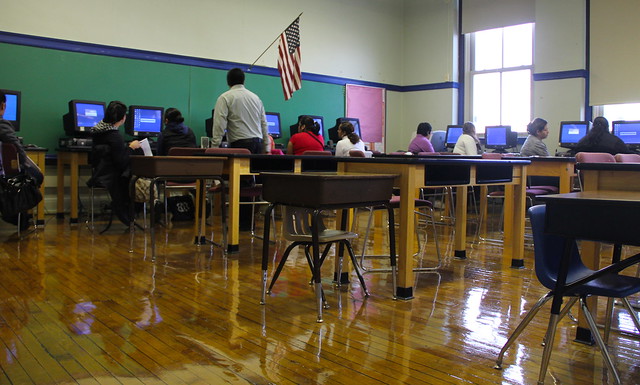
Civic 2.0 classes in Pilsen, one of five smart communities
The Smart Communities program aims to increase digital access and use by families, businesses and other institutions in five moderate- and low-income Chicago neighborhoods. This program, run by LISC Chicago, joint venture between the City of Chicago, and the Smart Chicago Collaborative has helped to increase internet usage by over 15%. The funding for this program was provided by the Broadband Technology Opportunities Grant, the MacArthur Foundation, and the McCormick Foundation and was administered in large part by the Chicago Community Trust and Smart Chicago.
The program uses a combination of community portals, technology training, and public computing centers known as FamilyNet Centers to help both provide digital access and skills in these five neighborhoods.
With the new tech plan, the city wants every community to be a smart community. Smart Chicago Collaborative, LISC Chicago, and World Business Chicago will be working with community partners to create a profile of a fully connected community that can be used as a benchmark, along with a toolkit of best practices, to help communities reach this standard of broadband access and use.
The toolkit will be influenced by our experience administering the city’s Broadband Technology Opportunity Grant. This will include the lessons we learned from running Connect Chicago: a loose network of more than 250 places in the city where Internet and computer access, and digital skills training are available free of charge.
Initiative 9: Offer digital training and hands-on technology experience
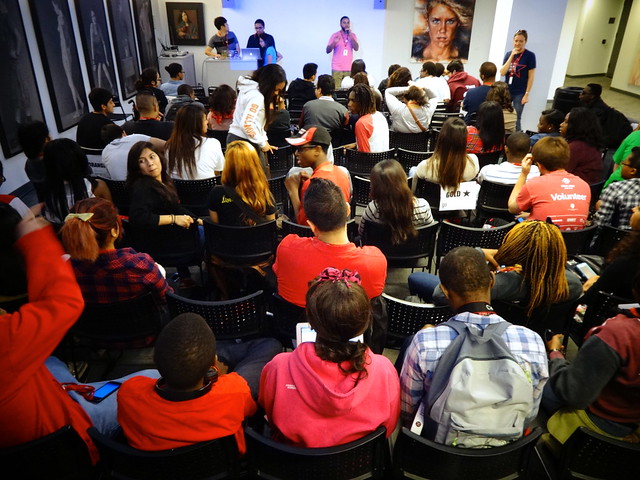
CivicSummer at Tribeca Flashpoint
SCC will facilitate the development of an open-source technology curriculum, designed to be used by anyone, to be taught at Connect Chicago sites. – Chicago Tech Plan
Smart Chicago Collaborative spent the summer building and teaching a curriculum around open source software, open data and technology as a career path as part of our civic summer program. We’ve also help curate online training resources for a variety of digital skills on the Connect Chicago website. As part of the city technology plan, we’re working to pull together a comprehensive listing of free online lessons on technology concepts and and software. These subjects are already going on all across the city, taught by colleges, industry experts, CyberNavigators, software companies, and teachers.
This is amazing work being done. By pulling it together in one place, we’ll have a culture of shared learning to bridge the digital skills gap and build more technology businesses. Smart Chicago is proud to take the lead on this initiative.
Initiative 11: Provide public computer access and support

Richard M Daley Library, another location where residents can access a computer for free.
Public computer centers are one way of providing access to computers, software, and the Internet at no cost to residents. – Chicago Tech Plan
Smart Chicago Collaborative administers the city’s Broadband Technology Opportunity Public Computer Centers grant. As part of that effort, Smart Chicago built We Connect Chicago. Connect Chicago is a loose network of more than 250 places in the city where Internet and computer access, and digital skills training are available free of charge.
We Connect Chicago is a joint project of the City, the John D. and Catherine T. MacArthur Foundation, and the Chicago Community Trust. Partnering organizations include Chicago Community Colleges, Chicago Housing Authority, Chicago Public Schools, Department of Family and Social Services, Smart Health Centers, and the Chicago Cook – Workforce Partnerships.
Initiative 20: Bolster transparency and support civic hackers

Chicago’s OpenGov Hack Night
DoIT and Smart Chicago Collaborative (SCC) will continue to provide a broad range of intellectual and financial resources to help residents and civic technologists use technology to improve urban life. – Chicago Tech Plan
Smart Chicago Collaborative will continue to provide infrastructure and support to civic innovation projects in Chicago. This includes hosted web space on our servers, civic user testing, and our sponsorship of the OpenGovChicago(-land) Meetup group and other gatherings.
In addition to continuing these efforts, Smart Chicago is committed to facilitating partnerships between community organizations and civic technologists. We believe strongly that these partnerships result in better civic apps and better solutions for organizations that are dealing with civic issues on a daily basis.
Initiative 22: Expand the number of successful networks that exist to connect entrepreneurs with customers, venture capital, and mentorship opportunities

ChicagoNEXT is an effort of the City of Chicago and the business community to spin up new entrepreneurship opportunities through partnerships and direct support to start-ups. In the next six months, the ChicagoNEXT will launch a mentor match-up program to give startups the best chance at success.
I serve as a member of ChicagoNEXT’s Web/Mobile Committee along with other members of Chicago’s technology sector and am a huge advocate for civic technology.
Initiative 25: The City will encourage technology firms in Chicago to share their civic pride to demonstrate to the world the many successes in, and vibrancy of, Chicago’s Technology Sector.
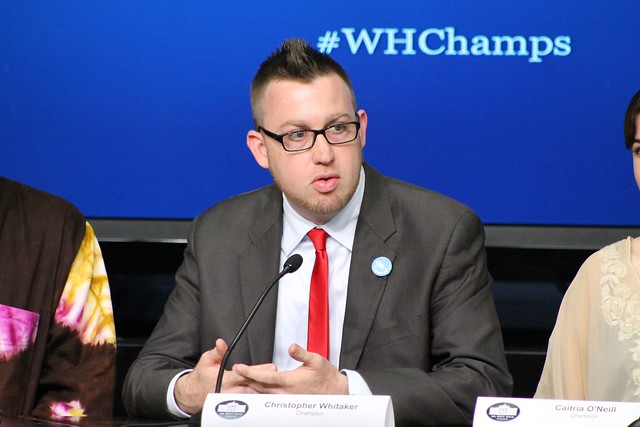
Christopher Whitaker speaking at the White House Champions of Change event, Photo by Kevin Curry
Smart Chicago will also continue to showcase community efforts on our blog and through our social media feeds. What makes this technology plan work is the thriving ecosystem that we’ve built in Chicago around civic innovation.
At the city level, the Department of Innovation and Technology is providing a wealth of information and their Director of Analytics is a constant presence at the OpenGovHack Night. By being present at the meetings, taking questions from the community, and keeping the community abreast of latest developments; Tom Schenk Jr is providing a tremendous amount of support to the Chicago civic innovators.
The weekly hack nights themselves – first organized by OpenCity – have become a model for civic hacking events around the country. The apps developed during the hack night have been redeployed in multiple cities. Chicago has plenty to be proud of!
What we do as civic technologists in Chicago gets noticed – and as Chicago’s civic innovators continue to do awesome work in the community we’ll do our best to help tell the story and support the effort along the way.
This plan, and our role in it, is a good example of why Smart Chicago exists– to pull together people, resources, and institutions in a common civic mission aligned with City government. We love what we do, we love our partners, and we welcome more.
